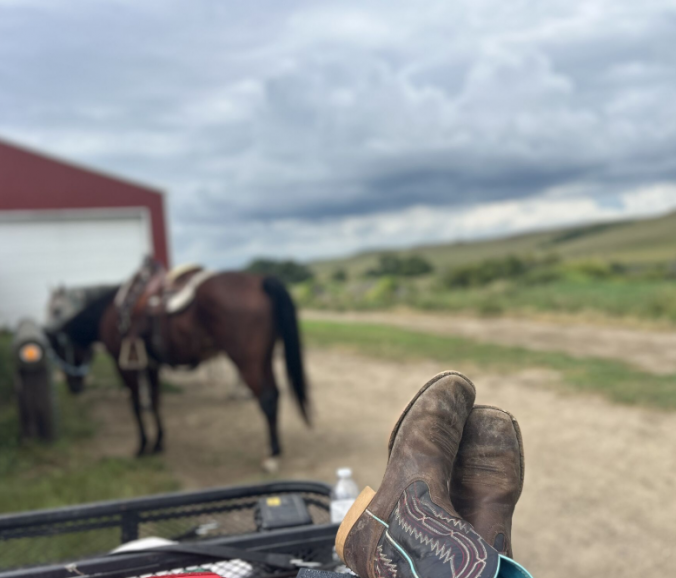Wherever you are right now, pause for a moment and look around. Find everything in your space that is the color brown.
Take a few seconds to really look.
Now close your eyes and, without opening them, try to recall everything around you that is the color green.
Most people struggle with this part. Not because green isn’t there, but because it wasn’t what we told ourselves to look for…And that’s the point.
What we focus on shapes what we notice. What we notice shapes how we feel. And over time, those feelings quietly shape how we experience the world.
This is why I talk so much, here and in my trainings, about joy, noticing small moments, and finding reasons to smile. Not because life is always light or easy (it isn’t), but because our perspective is deeply influenced by what we’re trained, consciously or unconsciously, to see.
In my wellness presentations, I often use something called the belief wheel. It helps explain how our beliefs, thoughts, feelings, behaviors, and results reinforce one another, sometimes without us ever realizing it.
It looks like this (as a wheel):
Belief → Thoughts → Feelings → Behaviors → Results → back to the original belief.
Let’s start with an intentionally dramatic example (stay with me):
Belief: No one will ever love me.
If that’s your starting belief, what thoughts do you think would follow?
Maybe things like: What’s wrong with me? Why do I even try? I must be unlovable.
Those thoughts then create feelings: sadness, defeat, anger, resentment, self-consciousness, confusion.
Now, how might you behave? If you believe you’re unlovable, you might give up, pull away, or put up walls. You might come across as guarded, shy, cold, uninterested, or overly nervous when you meet someone who could actually be kind or interested.
So what happens next?
The interaction gets awkward.
The person doesn’t call.
The connection fades.
And suddenly, the original belief feels confirmed: See? I told you no one would ever love me.
The wheel keeps spinning and looks like this:
Belief (no one loves me)→ Thoughts (what’s wrong with me?) → Feelings (sadness)→ Behaviors (guarded/shy) → Results (the person doesn’t call) → back to the original belief: See? I told you no one would ever love me.
Not because the belief was true, but because everything that followed was filtered through it. It’s the same reason the “brown and green” exercise works.
When we tell ourselves to look for brown, we find brown everywhere. Green disappears, not because it’s gone, but because it’s no longer our focus. Our limiting beliefs work the same way.
If we believe the world is unsafe, people are disappointing, joy is fleeting, we are undeserving, or happiness is something other people get, we will collect evidence to support that belief, even when other truths exist alongside it. But the truth is, we do not need to believe everything we think, and we shouldn’t.
This isn’t about toxic positivity.
It’s not about pretending things don’t hurt or forcing gratitude when you’re exhausted.
It is about challenging beliefs that don’t serve us: beliefs that don’t feel good, don’t help us heal, and often aren’t even true.
Sometimes it starts small, like noticing one good moment or letting yourself smile without explaining why. Paying attention to what feels steady, warm, or even neutral instead of focusing only on what feels heavy.
Other times, it means gently challenging yourself, maybe even having to “fake it till you make it”, by choosing to believe you are deserving of love. As that belief begins to shift, your thoughts, feelings, and behaviors slowly change too. Over time, those changes create different outcomes, in part because you’re finally looking for them.
These kinds of beliefs are what build confidence, excitement, and hopefulness.
Both small and big moments can interrupt the loop. They give your nervous system a break. They remind your brain that green exists too.
This is why I share happy photos and post funny things.
This is why I write about small joys and remembering to be happy.
It’s a practice of widening the lens and a reminder that even on hard days, something small can still be true, good, and worth believing in.
This is why my blog segment Happy Things Thursday exists; as a practice.
Because noticing doesn’t have to be dramatic.
A warm cup of coffee.
A breeze through an open window.
A moment where your shoulders relax a little easier.
These moments tell your nervous system: you’re okay right now.
So today, I’m sharing a few photos and happy things that made me smile recently. Not because everything is perfect in my life right now (newsflash: it isn’t) but because noticing is powerful. Believing in the happy parts of my life helps ensure my thoughts, feelings, and behaviors feel worth waking up to every day.
And sometimes, it’s enough to just start there, so I’ll leave you with three (non-preachy) points.
1. Your brain is doing its job, even when it’s annoying
Our brains are wired to scan for threat and problems, not joy. That’s not a personal failure, it’s biology. When we intentionally look for moments of ease or goodness, it can feel like a lot of work because we’re retraining a system that learned to survive first. One study suggests we have an average of 55,000 thoughts a day, and over 80% of them are negative. If that’s the case, that’s a lot of retraining and a lot of reason to give ourselves grace.
2. Neutral counts just as much as happy
This matters especially for people who live in high-stress or trauma-exposed worlds. You don’t have to jump straight to gratitude or joy. Neutral moments (quiet, steady, predictable) are often safer and more accessible, and that is okay right now.
3. Consistency matters more than intensity
It’s not about one big breakthrough moment. It’s about small, repeated reminders that safety, comfort, and goodness exist alongside the hard stuff. The ability to notice what is good is a skill, and like any skill, it can be practiced. Believing something positive can create better results in our lives, and those beliefs can be small. Something as simple as reflecting on three things you’re grateful for each day may feel “eye-roll-y”, but done consistently, it subtly retrains us to look for those things. It’s also about paying attention to what relaxes your body and softens your thoughts, it doesn’t always have to be big or joyful to matter.
Your mindset is powerful. It shapes your world and your reality. So whether you believe you can or you belive you can’t, you’re right.
– keep shining
Find me: Facebook, Instagram, Pinterest, LinkedIn





Recent Comments